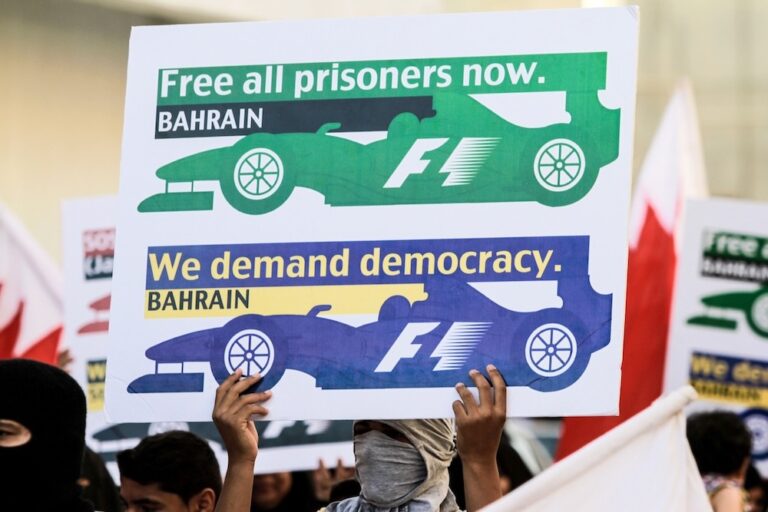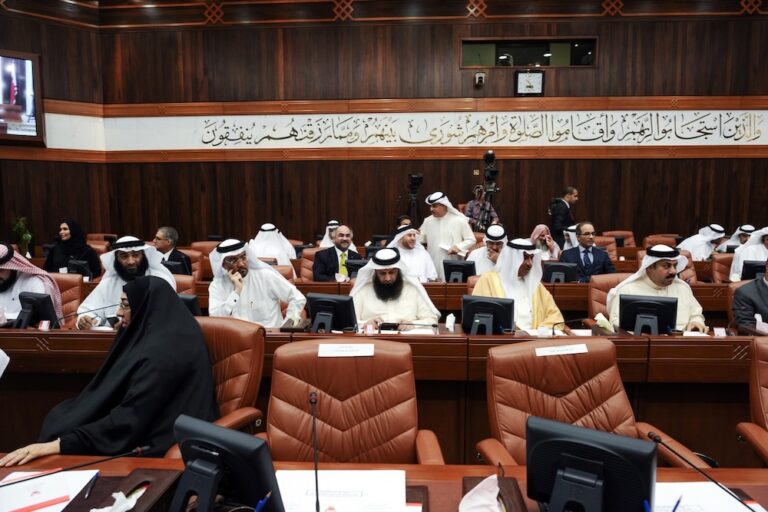For months the government has made token gestures rather than implement reforms that address the root causes of the grievances of the protestors, says Freedom House.
(Freedom House/IFEX) – Washington, February 13, 2012 – One year after the start of Bahrain’s February 14 “Pearl Roundabout” protests, Freedom House remembers those who have been injured and killed in the subsequent crackdown, urges the Bahraini government to allow peaceful protests to take place without interference, and continues to call for an end to abuses and the implementation of comprehensive reforms.
Bahraini citizens have been broadly engaged in protests since February 2011, to call for a more representative government and to denounce ethnic-based inequities in a country run by the Sunni Al-Khalifa royal family, where the majority of citizens are Shiite. In the weeks before the one-year anniversary of the uprisings, Bahrain prevented journalists, human rights organizations including Freedom House, as well as international observers from entering the country; instead, they asked groups to reschedule their visits. Meanwhile, despite promises of reform, Bahraini authorities have continued to use torture against detainees, block access to medical services, and raid the homes of suspected protesters.
“Bahraini citizens are fed up with their government’s systematic denial of basic freedoms,” said Robert Herman, vice president for regional programs at Freedom House. “For months the Bahraini government has made token gestures rather than implement reforms that address the root causes of the grievances of the protestors. The Bahraini people are tired of hearing the government say they are undertaking reform, while innocent people continue to be killed in the streets.”
Bahraini rights groups have reported ongoing arrests, intimidation, and in some cases torture of those speaking out against despotic rule. In 2011, during a three-month period of martial law starting in March 2011, hundreds of demonstrators were arrested, many facing torture. Thousands of Bahrainis who were associated with the protest movement were fired from their jobs for supporting demonstrators. Medical professionals who treated demonstrators were singled out by the government and some put on trial. Prominent human rights activists, opposition leaders, journalists and bloggers were also arrested and imprisoned in an attempt to stifle press freedom and freedom of expression.
While the U.S. has criticized Bahrain’s actions, it is unclear how much pressure is actually being placed on the Bahraini government to implement reforms. In October, the Obama Administration announced it would put on hold a proposed $53 million arms sale to the country; however the administration recently announced its intention to go forward with a smaller version that would circumvent public disclosure and congressional approval.
“That the US government would provide military support to the Bahraini government at a time when protesters are being violently targeted is tone deaf to the situation on the ground,” said Sarah Trister, manager of congressional affairs at Freedom House.
“The U.S. should be sending the message to its Bahraini allies that the future of the bilateral relationship depends on the institution of comprehensive reforms that address human rights abuses and the legitimate political desires of the Bahraini people.”
After international pressure to address human rights abuses, the ruling Al-Khalifa family commissioned an independent group of international experts to investigate the events of early 2011. The investigation resulted in a November 2011 report cataloguing human rights abuses committed by authorities against demonstrators. The report included recommended reforms to be implemented by the government, few of which the government has fully addressed.
Freedom House will host a panel discussion with Bahraini activists on February 15 to discuss Bahrain one year after the uprising. Learn more about the event here.
Bahrain is rated Not Free in Freedom in the World 2011, Freedom House’s annual global assessment of political rights and civil liberties and Not Free in Freedom of the Press 2011.


